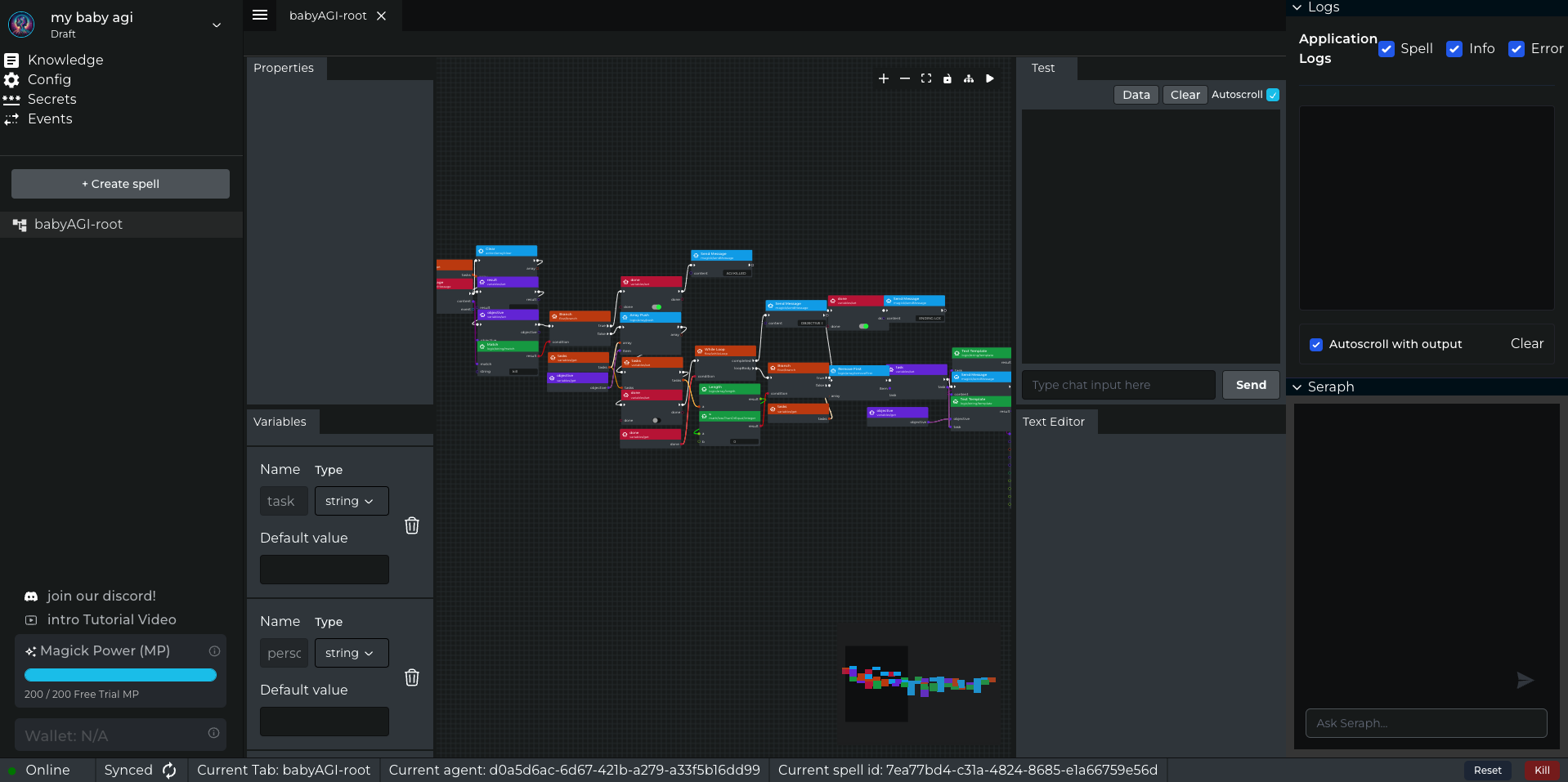Introduction
Magick is a powerful tool that enables you to create AI-powered agents using a visual programming node-based interface. It consists of three main components: the Portal, the IDE, and the Engine. Together, these components provide a seamless experience for developing, deploying, and managing AI agents.

Agents#
An agent in Magick is a long-running process that encapsulates intelligent software behavior. It is a piece of software that can think and act autonomously, augmented with language models (LLMs) and other AI capabilities. Agents can be tailored to various use cases, such as a Discord chatbot, a character's behavior in a video game, intelligent web assistants that actually know their product, or any other intelligent software you need.
Agents are powered by spells, which define their logic and behavior. An agent can have multiple spells, each responsible for a specific aspect of the agent's functionality. Agents are created and managed through the Magick Portal and can be deployed and scaled effortlessly using the Magick Engine.
Spells#
A spell in Magick is a graph-based representation of an agent's logic and behavior. It is composed of a chain of nodes, each representing a specific logical process or AI capability. The nodes are connected to form a directed acyclic graph (DAG), which ultimately builds to a JSON representation of the agent's functionality.
Spells are created and edited within the Magick IDE using a visual programming interface. By connecting various nodes together, you can define the flow of data and control within your agent. Spells can incorporate a wide range of AI capabilities, such as natural language processing, event handling, data manipulation, and more.
Key Components#
The AIDE#
The Magick AIDE (AI Integrated Development Environment) is where the magic happens. It is a visual programming environment that enables you to design and develop your AI agents using a node-based interface. With the IDE, you can:
- Create new Spells to give life to your AI agents
- Connect various nodes to define the logic and behavior of your agents
- Configure node properties and settings
- Test and debug your agents within the AIDE
- Publish new versions of your agents
- Manage secrets and environment variables
- Deploy your AI agents with a single click
The Portal#
The Magick Portal is the central hub where you create and manage your Magick account. It serves as the entry point for accessing various features and functionalities of the platform. With the Portal, you can:
- Create a new Magick account
- Manage your account settings and profile information
- Create and delete AI agents
- Manage your subscriptions and billing
- Access a library of Agent templates to kickstart your development
The Portal provides a user-friendly interface that simplifies the process of managing your Magick account and agents. Deploying agents via the portal abstracts away the complexities of deployment and scaling, allowing you to focus on creating and customizing your AI agents.
The Engine#
The Magick Engine is the backbone of the platform, responsible for executing and running your AI agents. It is a scalable and distributed runtime environment that handles the deployment, scaling, and management of your agents. With the Engine, you can:
- Deploy your agents with a single click
- Scale your agents automatically based on the workload and demand
- Monitor the performance and resource utilization of your agents
The Engine abstracts away the underlying infrastructure and provides a seamless experience for running your AI agents. It ensures high availability, fault tolerance, and efficient resource utilization, allowing your agents to handle large-scale and complex workloads.
Nodes and Capabilities#
Magick offers a wide range of pre-built nodes that enable you to leverage various AI capabilities in your agents. These nodes include:
- Natural Language Processing (NLP) nodes for text analysis and generative outputs
- Event nodes for triggering actions based on external events and triggers
- Logic nodes for conditional branching and decision-making
- Math nodes for performing mathematical operations
- Action nodes for interacting with external systems and services
- Data nodes for storing, retrieving, and manipulating data from a variety of sources
- Flow control nodes for managing the flow of execution within your agents
- Time nodes for time-based operations
- Queue nodes for managing variables and data flow
With these nodes, you can create AI agents that can understand and process text, make predictions and decisions based on data, and interact with external systems and services.
Deployment#
Deploying your AI agents with Magick is a seamless process. Once you have designed and tested your agent using the IDE, you can deploy it to the Magick Engine with a single click. The Engine takes care of provisioning the necessary resources, scaling your agent based on demand, and ensuring high availability.
Plugins#
Magick supports a plugin architecture that allows you to extend its capabilities beyond the built-in nodes and features. Plugins enable you to integrate custom nodes, external services, and third-party libraries into your agents.
The Magick community actively contributes to the plugin ecosystem, providing a wide range of plugins for various use cases and domains. You can browse and install plugins directly from within the IDE, making it easy to enhance your agents with additional functionality.
With Magick, you have the power to create intelligent agents that can understand, reason, and interact with the world around them. Whether you're building a chatbot, a virtual assistant, or a complex AI system, Magick provides the tools and capabilities you need to bring your ideas to life.
Start your journey with Magick today and unlock the potential of AI-powered agents!
